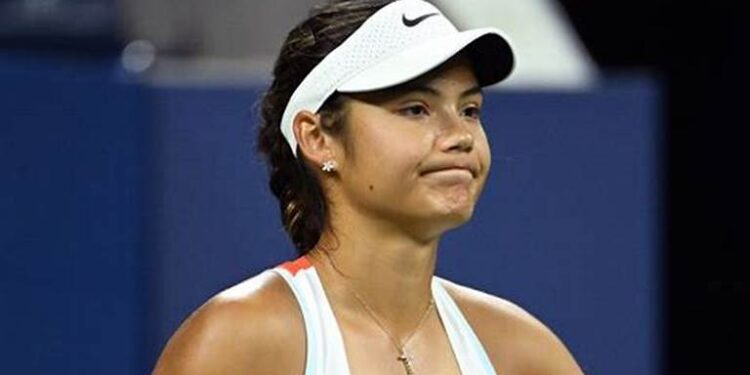Emma Raducanu’s ex-coach has recently opened up about her approach to the game, offering fresh insight into what he describes as a “stubborn” streak that may have impacted her rapid rise and subsequent career journey in tennis.

The candid revelations shine a light on some of the key challenges that Raducanu and her team have faced as she navigates her transition from a stunning Grand Slam champion to a player striving to maintain consistency and momentum on the WTA Tour.
### Early Success and Pressures of Stardom
Raducanu’s career skyrocketed in 2021 when she captured the U.S. Open title as an 18-year-old qualifier, winning the Grand Slam without dropping a set. Her journey was one of the most astonishing stories in modern tennis, with fans and analysts alike hailing her as the next big talent.
However, the early stardom brought with it a wave of expectations and scrutiny, especially as she worked to find her footing as a regular competitor on the pro circuit.
### Frequent Changes in Coaching Staff
A major storyline in Raducanu’s young career has been the revolving door of coaches, each of whom has been brought in to help mold her game but ultimately parted ways after a short stint.
This high turnover rate has led many to question the stability of her team, with some speculating that Raducanu may struggle to find a coaching style and strategy that complements her talent and personality.
Raducanu has worked with several coaches in just a few short years, each bringing different experiences and philosophies to the table. The frequent coaching changes, though often described as “mutual,” indicate a search for the right dynamic. According to her former coach, her “stubborn” approach has sometimes contributed to these brief partnerships.
The coach noted that while Raducanu is deeply committed and hard-working, she often has a fixed mindset regarding her game, which has made her less receptive to advice she might not initially agree with.
### Insights from Her Ex-Coach on “Stubborn” Approach
In his recent comments, Raducanu’s former coach elaborated on her personality, describing her as “strong-willed” and “driven,” but also suggesting that her resolve could sometimes lead to rigidity.
“Emma has a clear vision of what she wants to achieve, and she has certain ideas about how she should play her game,” he remarked. “While it’s admirable for a player to have such confidence and direction, there are moments when it may be beneficial to be more adaptable, especially given how young she is.”
The ex-coach emphasized that this approach could hinder her ability to fully benefit from external feedback, noting that many top players, even those who have achieved great success, often show flexibility when integrating new strategies.
“Tennis is a game that constantly evolves, and the best players learn to adapt,” he added. “Emma’s strong-willed nature is part of what makes her competitive, but if she wants to reach her full potential, it may be important to sometimes loosen that grip on her vision and trust the input of those around her.”
### The Balancing Act Between Independence and Flexibility
While Raducanu’s “stubborn” approach may pose challenges, it also highlights her independence and inner strength. Being headstrong can be an asset in high-stakes matches, where conviction and self-belief can carry players through difficult situations.
However, the key challenge for Raducanu and her team is to find a balance between this independence and a willingness to adjust her game to incorporate different coaching perspectives.
Many young players who find early success face similar hurdles, as their confidence may create blind spots that prevent them from addressing weaknesses. Her former coach noted that the role of a coach in Raducanu’s situation should ideally be one of guidance, helping her recognize areas for improvement without undermining her confidence.
However, this approach can be difficult to implement if the player is resistant to change.
### Reflections from the Coaching Circuit on Raducanu’s Potential
In addition to her former coach, other figures in the coaching world have weighed in on the dynamics that might influence Raducanu’s trajectory. One renowned coach mentioned that her case isn’t unique; many promising players have faltered after an early breakthrough, particularly if they remain inflexible in their approach to development.
“It’s not unusual for young stars to be single-minded. But the real trick is learning when to adapt. When you’re winning, it’s easy to believe you have it all figured out,” he said. “The ones who go on to be great champions are those who realize that learning is an ongoing process, even when you’re already at the top.”
These insights suggest that Raducanu’s journey is still evolving and that her potential remains immense if she can strike the right balance between confidence and openness to change.
Her former coach added that Raducanu has all the physical tools necessary to succeed but that she could benefit from a long-term coach who will not only guide her game technically but also help her build a mindset oriented toward growth and flexibility.
### The Role of “Stubbornness” in Building a Champion
Interestingly, stubbornness or strong-mindedness is often present in elite athletes. Many champions in various sports have a single-minded focus on their goals, an unshakable belief in their methods, and a resistance to outside influence when they feel secure in their approach.
This personality trait can indeed contribute to success, as it often drives athletes to push through obstacles and maintain focus on their goals despite the odds.
However, Raducanu’s former coach argues that in tennis—a sport that requires constant adaptation—stubbornness must be managed carefully. “Some stubbornness is healthy,” he remarked.
“It’s what makes players fierce competitors. But too much, and you risk missing out on valuable adjustments that could help you adapt to different playing styles, opponents, and pressures.”
### Pressure to Find Consistency Amid High Expectations
As Raducanu faces the high expectations that come with her Grand Slam title, the pressure to find stability and achieve consistent results on the tour remains a dominant theme.
Her coach emphasized that while Raducanu’s potential is unquestionable, achieving long-term success will depend on her ability to adapt to changing circumstances—whether that means accepting new techniques, strategies, or even adjustments in her physical conditioning.
Since winning the U.S. Open, Raducanu has encountered a mix of injuries and inconsistencies, making it difficult to regain the momentum she achieved in 2021.
Injuries, in particular, have kept her from building a sustained run on the tour, a common issue for young players adjusting to the physical demands of the WTA schedule.
Her coach pointed out that a greater willingness to adapt in areas like training and recovery could enhance her longevity and resilience.
### The Path Forward: Potential Solutions for Raducanu’s Development
One potential solution for Raducanu might be to work with a mentor who can guide her in a holistic manner, offering support not only in tennis techniques but also in mental resilience, lifestyle management, and strategic adaptation.
Her coach suggested that Raducanu could benefit from someone who can act as both a technical coach and a life coach, helping her navigate the complexities of life on the professional circuit.
Additionally, the former coach highlighted the importance of consistency in her coaching staff.
A stable coaching relationship could provide Raducanu with the time and support needed to refine her game gradually, allowing for the small but significant adjustments that often separate good players from great ones.
By building trust in a coach who understands her strengths and weaknesses, Raducanu could potentially shift away from her “stubborn” mindset and embrace a more collaborative approach.
### Conclusion: Embracing Growth While Staying True to Herself
Emma Raducanu’s journey reflects the delicate balance between staying true to one’s vision and being open to growth.
Her “stubborn” approach has undoubtedly contributed to her meteoric rise, but her future success may depend on her ability to embrace feedback, adapt to the demands of the tour, and cultivate relationships with a coaching team that complements her aspirations.
Her former coach’s comments offer a revealing look into the dynamics that shape a young athlete’s career, especially one as talented and ambitious as Raducanu. As she continues to mature, the tennis world will be watching closely to see how she balances her innate drive with the flexibility required to excel at the highest levels.
The path forward for Raducanu is challenging, but if she can harness her natural determination while remaining receptive to change, her potential is limitless.









